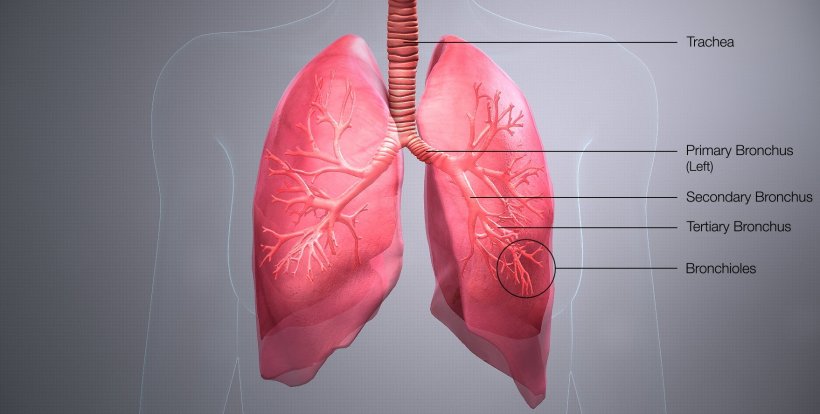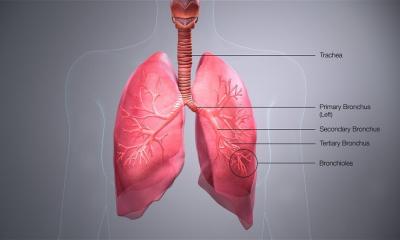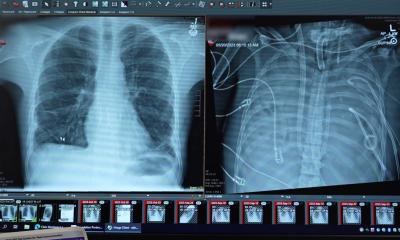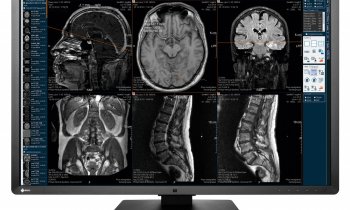News • Life-saving treatment
First double-lung transplant after Covid-19 performed in Portugal
Doctors in Lisbon report on the case of a 61-year-old man who received a double lung transplant after his lungs were irreparably damaged by Covid-19, in a case report being presented at Euroanaesthesia, the annual meeting of the European Society of Anaesthesiology and Intensive Care (ESAIC), held online this year (17-19 Dec).
The patient contracted Covid-19 in January, 2021, and was discharged from hospital on 23 August, marking the Centro Hospitalar Universitário Lisboa Central's first successful lung transplant in a Covid-19 survivor.
The man, who had a history of dyslipidaemia (unusually high levels of cholesterol and other fats in the blood) and gastritis (inflammation of the stomach lining), was admitted in the emergency department with SARS-CoV-2 pneumonia on 12 January, 2021. Despite support from a ventilator, he deteriorated with severe breathlessness due to low oxygen levels and required the advanced lung support therapy, extracorporeal membrane oxygenation (ECMO)—that completely takes over the function of the lungs. He spent 74 days on ECMO before being switched to extracorporeal carbon dioxide removal (ECCO2R)—a device designed to remove carbon dioxide but does not provide such a high level of oxygen.
The patient qualified for transplant because he was young and strong enough to survive the risky procedures, and no other organs had been impacted by Covid-19
Carolina Almeida
During those three months, he suffered multiple infections including pneumonia and prostatitis (swelling of the prostate gland) as well as blood complications including a blood clotting disorder (ECMO-associated coagulopathy) and a life-threatening reaction to the blood-thinning medication heparin (heparin induced thrombocytopenia). "About 75% of the patient's lungs had been scarred by Covid-19, and it was clear from his scans that his lungs were permanently damaged, and would not recover", says anesthetist Dr. Carolina Almeida from Centro Hospitalar Universitário Lisboa Central, who was part of the team who performed the transplant. "The patient qualified for transplant because he was young and strong enough to survive the risky procedures, and no other organs had been impacted by Covid-19. After careful clinical evaluation, he received the life-saving organs in May."
The surgery took about seven hours and involved two weeks of post-operative intensive care.
It has been six months since the transplant, and his recovery is by no means complete, the doctors report. His lung function is good and he no longer requires daytime oxygen support, but he has had to overcome numerous challenges on the recovery journey, including atrial fibrillation (irregular heart rhythm), a collapsed lung, subcutaneous emphysema (in which air becomes trapped under the skin), type 2 diabetes, and several infections. He continues to receive rehabilitation to improve his mobility, lung function, and quality of life, and will have to take more than a dozen medications for the rest of his life to prevent organ rejection and infections. "The team are hugely grateful that the surgery went so well and that the patient made it home to continue rehabilitation close to his family", says Dr. Lurdes Castro, a senior anaesthesiologist from Centro Hospitalar Universitário Lisboa Central who helped perform the transplant. "It requires enormous willpower to overcome everything he has endured, and it is wonderful to have played a part in giving this patient the opportunity to live again and return to his family and previous life."
The first small case-series of early outcomes after lung transplantation for severe Covid-19 was published in May, 2021. "Lung transplantation is a lifesaving treatment for a carefully selected group of Covid-19 patients whose lungs have been irreparably damaged by the virus and who are strong enough to undergo major transplant surgery", says Dr. Almeida. "But given the impact of Covid-19 worldwide, and the increasing number of younger, healthier patients affected, the number of transplant candidates is likely to increase considerably. That number could grow to include Covid-19 survivors whose lungs may deteriorate over time."
Source: European Society of Anaesthesiology and Intensive Care
17.12.2021











